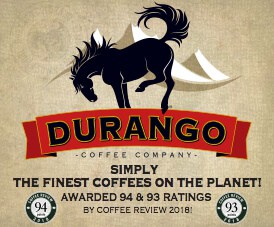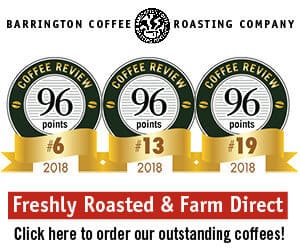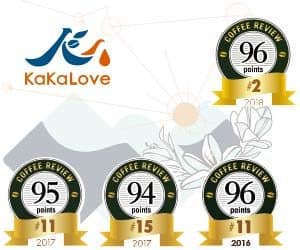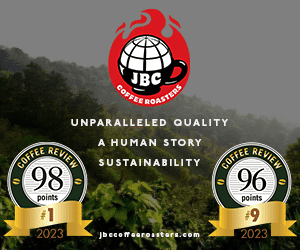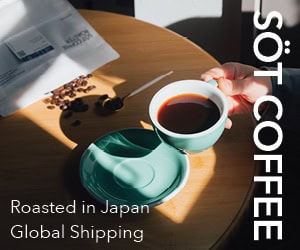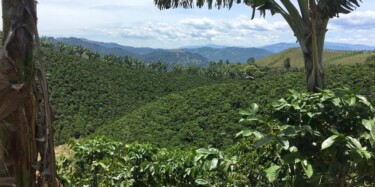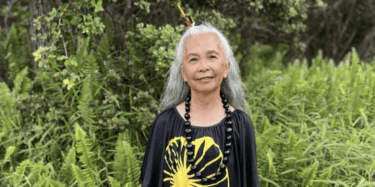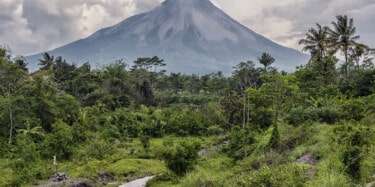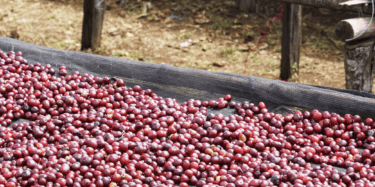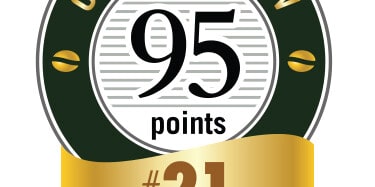Produced by smallholding farmers of the Dukunde Kawa Cooperative, entirely of the Bourbon variety of Arabica, and processed by the triple-washed anaerobic method (the fermentation step occurs in a hermetically sealed vessel) at the Mbilima Washing Station. Certified USDA Organic and Fair Trade. SkyTop Coffee is a USDA-certified organic specialty coffee roaster based in Manlius, New York. For more
SEARCH RESULTS
Shop for the Top 30 Coffees of 2023
Resolve to Drink Better Coffee in 2024 If you're looking to drink better coffee in 2024, we’re pleased to help facilitate your shopping by providing links to roasters’ websites where some of the Top 30 coffees of 2023 may be available for purchase. As of the morning of Monday, January 1st, 2024, the Top 30 coffees below were available for purchase on roasters’ websites: No. 2 | Review | Shop
Fruit- and Spice-Fermented Coffees: The Cup and the Controversy
At the experimental tip of the specialty coffee world, the excitement never stops. The latest processing twist from Colombian and Central American coffee growers involves putting natural fruit, herbs or spices into the fermentation tank with the coffee during processing. The fermentation tanks are usually sealed, making this fermentation anaerobic as well. Readers of our March 2023 report know
Mexico Los Aguacates
This exceptional coffee was selected as the No. 28 coffee on Coffee Review’s list of the Top 30 Coffees of 2023. Produced by Augustin Lopez Guzman of Finca Los Aguacates, from trees of the Caturra, Garnica and Bourbon varieties of Arabica, and processed by the traditional washed method (fruit skin and pulp removed before drying). SkyTop Coffee is a USDA-certified organic specialty coffee roaster
Guatemala Atitlan
Produced by smallholding members of the Cooperativa Agrícola Integral El Renacimiento R.L., from trees of the Bourbon, Catuai, Catimor, Caturra and Sarchimor varieties of Arabica, and processed by the traditional washed method (fruit skin and pulp removed before drying). SkyTop Coffee is a USDA-certified organic specialty coffee roaster based in Manlius, New York. For more information, visit
Peru Paltachayoc
Produced by Braulio Barazorda Borda and Valentin Champi Paullo of the Huadquiña Cooperative, entirely of the Typica variety of Arabica, and processed by the traditional washed method (fruit skin and pulp removed before drying). SkyTop Coffee is a USDA-certified organic specialty coffee roaster based in Manlius, New York. For more information, visit skytopcoffee.com.
Mexico San Cristobal Decaf
A combination of Marsellesa, Costa Rica, Typica and Caturra varieties of Arabica, processed by the traditional washed method (fruit skin and pulp removed before drying), and decaffeinated in Mexico using ethyl acetate, a solvent derived from sugar cane. SkyTop Coffee is a USDA-certified organic specialty coffee roaster based in Manlius, New York. For more information, visit skytopcoffee.com.
Ten Coffees From Women Producers That Should Be On Your Radar
When we last visited the subject of women coffee farmers for a tasting report in 2017, we explored the landscape of gender (in)equity through the lens of roasters who had purchased coffees produced by women — as farm owners, farmers in the field, as part of cooperatives, and as collectives pulled together by intention or by fate. It is still the case that, while women own between 20 and 30 percent
Old Style and New: Coffees of Java and Bali
Java and Bali are familiar names in the atlas of legend and imagination: Java mainly because of an historical association with coffee so powerful that it lent coffee one of its nicknames, and Bali for reasons that have little to do with coffee, but with the famous beauty of the island and its people and culture. Today, both islands produce coffees of charm and interest, and this month we report on
2023 Preview: Coffee Trends, Controversies and Change
What is trending in the specialty coffee world for 2023? What will be 2023’s major controversies or issues? Which origin countries or regions should Coffee Review look in on? Every December brings a round of often intense debate and speculation as we at Coffee Review exchange emails and bang heads trying to come up with topics for the following year’s 10 tasting reports. For these reports, we
Mexico Cup of Excellence #7
Produced by Gibran Leonardo Cervantes Covarrubias of Cafetal El Equimite entirely of the Geisha variety of Arabica, and processed by the natural method (dried in the whole fruit). Certified USDA Organic. SkyTop Coffee is a USDA certified-organic specialty coffee roaster based in Manlius, New York. For more information, visit skytopcoffee.com.
Colombia Finca Santa Maria Honey Tabi
Produced by 22 women farmers of Finca Santa Maria entirely of the Tabi variety of Arabica, and processed by the honey method, in which the skins are removed from the fruit but some of the fruit flesh (mucilage) is allowed to dry on the beans. Certifications include Con Manos de Mujer, Rainforest Alliance, USDA Organic and Bird Friendly. SkyTop Coffee is a USDA certified-organic specialty coffee
Mexico La Peña
Produced by Ismael Ramirez Roblero of Finca La Peña from trees of the Bourbon, Catimor and Marsellesa varieties of Arabica, and processed by the traditional washed method (fruit skin and pulp are removed before drying). Certified USDA Organic. SkyTop Coffee is a USDA certified-organic specialty coffee roaster based in Manlius, New York. For more information, visit skytopcoffee.com.
Sticking with the Classic: 8 Coffees from Southern California Roasters
The ever-evolving world of specialty coffee continues to see rapid growth in the area of product differentiation, with a strong emphasis on processing innovation at the farm level. In the last decade or so, as the story of each individual coffee has become more important to the consumer, it is variation in processing method that seems to get the most attention. Perhaps that’s because
Fruit Bombs Are the Point: Natural-Processed Espressos Defy Convention
The Coffee Review lab has smelled like a candy store for the last few weeks — a Willy Wonka factory for grownups. Of the hundreds of coffees we cup every year, a growing percentage of them are natural-processed. In the wine world, the word “natural” doesn’t mean anything in particular, is more of a marketing term designed to imply minimal intervention in the winemaking process. In coffee,
Peru Gesha
Produced by Feliciano Huayllas Candia of Kukipata Belen Farm entirely of the admired Gesha (also spelled Geisha) variety of Arabica, and processed by the washed method (fruit skin and flesh are removed from the beans before they are dried). This coffee took 11th place in the 2021 Peru Cup of Excellence Competition. SkyTop Coffee is a USDA certified-organic specialty coffee roaster based in
Sumatra Boru Batak
This exceptional coffee was selected as the No. 21 coffee on Coffee Review’s list of the Top 30 Coffees of 2022. Produced by smallholding farmers from trees of the Ateng, Jember and Garundang varieties of Arabica, and processed by the traditional Sumatra wet-hulled method. Bird Rock Coffee Roasters is a retailer and wholesaler focused on organic and socially responsible coffees; it was awarded the
Ethiopia Anaerobic Shantawene
Certified USDA Organic. Produced by 1,000 smallholding farmers organized around the Testi Ayla washing station, and processed by the anaerobic natural method (fermented in the whole fruit in an oxygen-free vessel). SkyTop Coffee is a USDA certified-organic specialty coffee roaster based in Manlius, New York. For more information, visit skytopcoffee.com.
Ethiopia Washed Shantawene
Certified USDA Organic. Produced by 1,000 smallholding farmers organized around the Testi Ayla washing station, and processed by the traditional washed method (fruit skin and flesh are removed from the beans before they are dried). SkyTop Coffee is a USDA certified-organic specialty coffee roaster based in Manlius, New York. For more information, visit skytopcoffee.com.
Colombia Gesha
Produced at Finca Santa Maria entirely of the celebrated Gesha (also spelled Geisha) variety of Arabica, and processed by the honey method, in which some sweet pulp or fruit flesh (“honey”) is allowed to adhere to the beans during drying. Finca Santa Maria is certified with the Con Manos de Mujer seal, verifying that it was produced by women farmers. SkyTop Coffee is a USDA certified-organic


